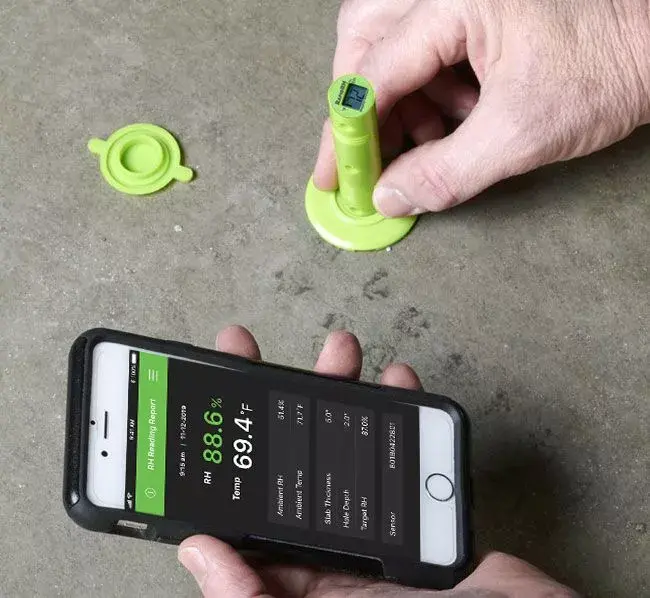
Investing in a construction project is a sustainable investment, and ensuring its success requires attention to various critical details. One of the most critical aspects of a successful construction project is ensuring that the flooring installation is carried out appropriately. This includes verifying that the concrete slab on which the flooring is to be installed has the correct moisture content. This is where hiring an independent ICRI certified concrete moisture test comes into play.
The International Concrete Repair Institute (ICRI) is a professional organization that develops and promotes best practices in the concrete repair and restoration industry. One of the certifications offered by the ICRI is for concrete moisture testing. An independent ICRI certified concrete moisture test will have undergone rigorous training and testing to obtain this certification, making them highly qualified to conduct concrete moisture tests on construction projects.
The importance of concrete moisture testing cannot be overstated. If a concrete slab has too much moisture, it can cause problems with the installation of the flooring, leading to costly and time-consuming repairs. Excessive moisture can also cause problems after the flooring is installed, causing adhesives to fail, bonding issues, and flooring delamination and blistering. This is often seen with fast paced construction projects scheduled with newly placed concrete, and HVAC systems being “turned on” after the floors have already been installed.
Hiring an independent ICRI certified concrete moisture test for every construction project that will have new flooring installed directly to concrete is a smart investment for several reasons.
The importance of hiring an independent ICRI certified concrete moisture test:
Ensures Unbiased and Reliable Results:
Independence in testing ensures unbiased and reliable results, as the tester is not affiliated with any particular flooring or construction company. This neutrality allows for a more accurate assessment of the moisture content in the concrete slab.
Follows Industry Best Practices:
Time and Cost-Saving Measure:
Peace of Mind:
Considering the impact of flooring on the overall success of a construction project, investing in an independent ICRI certified concrete moisture test is a wise decision. It ensures that the moisture content in the concrete slab is accurately assessed, preventing costly and time-consuming repairs later on. It also provides peace of mind to the project owner, knowing that the flooring installation will be carried out correctly.
By investing in an independent ICRI certified concrete moisture test, construction projects can be completed more efficiently and effectively, ensuring the success, and longevity, of the project.
Who Needs Moisture Testing?
Floor system manufacturers, flooring installers, general contractors, engineering firms, architects, owners, school districts, and REITs all share a vested interest in the long-term success and durability of their floors. Recent history underscores the importance of moisture testing in minimizing the risk of floor failure. To safeguard your project, contact us today to schedule your independent 3rd party concrete moisture testing services.
Concrete Slab Techs, with ICRI Certified Concrete Slab Moisture Testing Technicians, offers timely, professional, and accurate reports, providing you with the peace of mind you deserve.
Contact us today to schedule your project.
Concrete Slab Techs offers independent 3rd party concrete moisture testing services. Whether specified for new construction, or due to suspected moisture levels for a renovation project, Concrete Slab Techs will provide you peace of mind with timely, professional, and accurate reports. We are ICRI Certified Concrete Slab Moisture Testing Technicians.
Types of Moisture Tests We Perform:
Relative Humidity Probe Test:

ASTM F2170 Standard Test Method for Determining Relative Humidity in Concrete Floor Slabs Using in situ Probes.
Rh Testing has quickly become the preferential testing method for most flooring installations.
This test is conducted by drilling a hole into the body of the concrete and measuring the relative humidity at the bottom of the hole using a probe. A recent update to the ASTM standard has reduced the minimum equilibrium time to 24 hours, making this test more viable in time-sensitive situations.
Calcium Chloride/ Moisture Vapor Emission Rate (MVER) Testing:
ASTM F1869 Standard Test Method for Measuring Moisture Vapor Emission Rate of Concrete Subfloor Using Anhydrous Calcium Chloride. This test method provides valuable information about how much moisture is being emitted from the surface of the concrete.
This test has been used for 50 years and is still a recommended test method for many product manufactures., 3 tests are placed within the first 1000 square feet, and 1 for each additional 1000 square feet.

Each test is conducted by placing a dish of calcium chloride pearls on a diamond ground concrete surface, then covering the test site with a plastic dome. The test site will remain sealed for 60-72 hours to allow moisture from the surface of the concrete to absorb into the calcium chloride dish. Afterward, the amount of moisture absorbed during the test will be measured by calculating the difference in the weight of the dish pre and post-test.
The final test result is expressed by pounds of vapor over 1,000 square feet of concrete over a 24 hour period. Product limits for this test can be as low as 3 pounds for very sensitive floor types and as high as 8+ pounds for less sensitive floor coverings.
PH Testing:
ASTM F710 Standard Practice for Preparing Concrete Floors to Receive Resilient Flooring.

This test method measures the concentration of hydrogen ions within an aqueous solution. Both high concentrations (acidic) and low concentrations (alkaline) are known to negatively affect the viability of flooring and adhesives. Since flooring manufacturers specify guidelines for pH, it is also critical to know if your concrete is within these specifications in order to avoid flooring failures or expensive flooring installation mistakes.

Comments